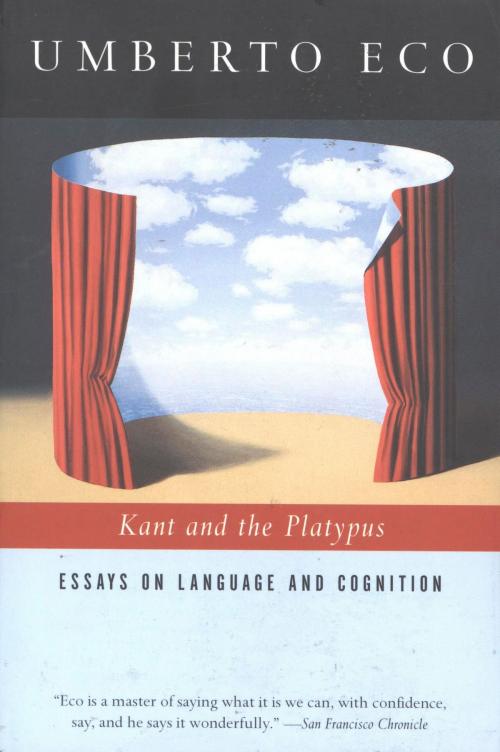Kant and the Platypus
Essays on Language and Cognition
Fiction & Literature, Literary Theory & Criticism, Theory, Nonfiction, Reference & Language, Language Arts, Linguistics, Religion & Spirituality, Philosophy| Author: | Umberto Eco | ISBN: | 9780547563787 |
| Publisher: | Houghton Mifflin Harcourt | Publication: | November 9, 2000 |
| Imprint: | Mariner Books | Language: | English |
| Author: | Umberto Eco |
| ISBN: | 9780547563787 |
| Publisher: | Houghton Mifflin Harcourt |
| Publication: | November 9, 2000 |
| Imprint: | Mariner Books |
| Language: | English |
How do we know a cat is a cat . . . and why do we call it a cat? An “intriguing and often fascinating” look at words, perceptions, and the relationship between them (Newark Star-Ledger).
In Kant and the Platypus, the renowned semiotician, philosopher, and bestselling author of The Name of the Rose and Foucault’s Pendulum explores the question of how much of our perception of things is based on cognitive ability, and how much on linguistic resources.
In six remarkable essays, Umberto Eco explores in depth questions of reality, perception, and experience. Basing his ideas on common sense, Eco shares a vast wealth of literary and historical knowledge, touching on issues that affect us every day. At once philosophical and amusing, Kant and the Platypus is a tour of the world of our senses, told by a master of knowing what is real and what is not.
“An erudite, detailed inquirity into the philosophy of mind . . . Here, Eco is continental philosopher, semiotician, and cognitive scientist rolled all into one.” —Library Journal (starred review)
How do we know a cat is a cat . . . and why do we call it a cat? An “intriguing and often fascinating” look at words, perceptions, and the relationship between them (Newark Star-Ledger).
In Kant and the Platypus, the renowned semiotician, philosopher, and bestselling author of The Name of the Rose and Foucault’s Pendulum explores the question of how much of our perception of things is based on cognitive ability, and how much on linguistic resources.
In six remarkable essays, Umberto Eco explores in depth questions of reality, perception, and experience. Basing his ideas on common sense, Eco shares a vast wealth of literary and historical knowledge, touching on issues that affect us every day. At once philosophical and amusing, Kant and the Platypus is a tour of the world of our senses, told by a master of knowing what is real and what is not.
“An erudite, detailed inquirity into the philosophy of mind . . . Here, Eco is continental philosopher, semiotician, and cognitive scientist rolled all into one.” —Library Journal (starred review)















